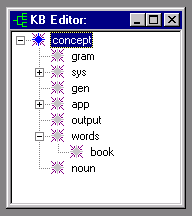
Add the concept value valueConcept to the attribute attrNameString belonging to the concept concept.
addconval(concept, attrNameString, valueConcept)
concept - type: con
attrNameString - type: str
valueConcept - type: con
Nothing
Concepts can have zero or more attributes, and attributes can have zero or more values. Values of attributes can be strings, numbers or other concepts. This function adds a concept to the value of other another concept's attribute. All concepts need to be rooted in the concept hierarchy, so first you need to create them before you can assign them as values of attributes to other concepts.
If the attribute doesn't exist yet, addconval will create it. If the concept or the value concept is bad, an error appears in the log output window.
In this example, we show how we can create a concept like noun and assign it as the value of a word's attribute. We create the concepts named words and noun as children to the root of the KB (concept), and then make the concept book a child of words.
G("words") = makeconcept(findroot(), "words");
G("noun") = makeconcept(findroot(),"noun");
G("noun_book") = makeconcept(G("words"),"book");
The KB editor at this point looks like:

Next, give book the attribute "is a" and make the concept noun be the value of book's attribute "is a":
G("an_attr") = addattr(G("noun_book"),"is a");
addconval(G("noun_book"), "is a", G("noun"));
The remaining code finds the first child of words named book, gets the concept which is the value of the attribute "is a" and prints out its name ('noun') to output.txt:
G("aConcept") = getconcept(G("words"),"book");
G("anotherConcept") = getconval(findvals(G("aConcept"),"is a"));
"output.txt" << conceptname(G("anotherConcept")) << "\n";